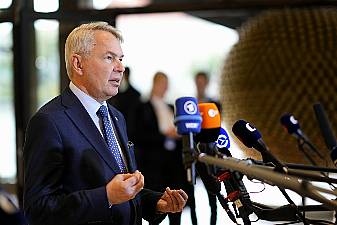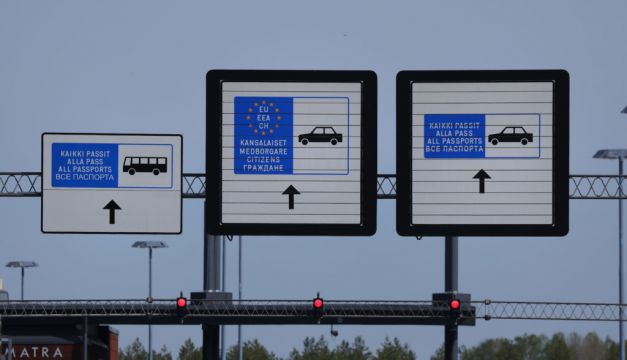Traffic arriving at Finland's eastern border with Russia "intensified" overnight after president Vladimir Putin ordered a partial military mobilisation and remained elevated on Thursday but was under control, the Finnish border guard said.
At the Vaalimaa border crossing, roughly three hours' drive from Russia's second-largest city St Petersburg, three lanes of cars each stretched for 300-400 metres at around 1.15pm local time (11.15 Irish time), a border official told Reuters.
The crossing is one of nine on Finland's 1,300km border with Russia, the longest in the European Union.
Defence minister Antti Kaikkonen said on Wednesday Finland is closely monitoring the situation in its neighbour following Putin's order on Wednesday of a mobilisation for the war in Ukraine.
Putin's announcement, made in an early-morning television address, raised fears that some men of fighting age would not be allowed to leave Russia and prompted one-way flights out of the country to sell out fast.
Finnish land border crossings have remained among the few entry points into Europe for Russians after a string of Western countries shut both physical frontiers and their air space to Russian planes in response to Russia's invasion of Ukraine.
"Traffic at the Finnish-Russian border intensified during the night," the border guard's head of international affairs, Matti Pitkaniitty, said in a tweet. He told Reuters that border guards were ready at the nine checkpoints.
Although traffic from Russia was busier than normal, the border guards said in a statement that it had not changed "alarmingly" in recent days compared with pre-pandemic times.
The statement warned that "incorrect and misleading" information was circulating on social media.
At around 3.40pm local time, traffic had quietened somewhat, according to a Reuters witness, with cars stretching over three lanes, each for some 150 metres.
Finland opted to keep its frontier with Russia open following Moscow's February 24th invasion of Ukraine although it has cut back the number of consular appointments available to Russian travellers seeking visas.
Estonia, Latvia, Lithuania and Poland, the other EU countries that border Russian territory, began turning away Russian citizens from crossings at midnight on Monday, saying they should not travel while their country is at war with Ukraine.
The three Baltic nations will offer no refuge to any Russians fleeing Moscow's mobilisation of troops, their ministers said on Wednesday.

Finland is working on its own national solution to limit tourist traffic from Russia, foreign minister Pekka Haavisto said during a visit to New York late on Wednesday.
"Finland does not want to be a transit country for (EU) Schengen visas issued by other countries. This is the traffic we want to get under control," Haavisto told journalists.
Pitkaniitty said 4,824 Russians arrived in Finland via the eastern border on Wednesday, up from 3,133 a week earlier.
In far northern Norway there had been no changes in the number of Russians crossing, a police official told Reuters. Norway is not a member of the EU.







